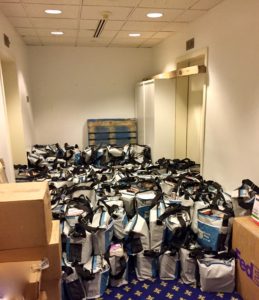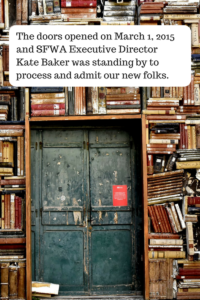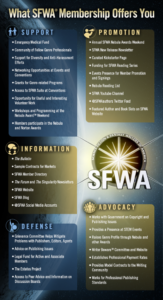
 The Science Fiction and Fantasy Writers of America, an august non-profit on whose board I have served in the past, held its business meeting in January of this year, and since it was virtual, I had the chance to attend, which was a nice chance to see some familiar faces, meet some new ones, and hear what the organization has been up to in the past year.
The Science Fiction and Fantasy Writers of America, an august non-profit on whose board I have served in the past, held its business meeting in January of this year, and since it was virtual, I had the chance to attend, which was a nice chance to see some familiar faces, meet some new ones, and hear what the organization has been up to in the past year.
An interesting development for SFWA that seems to have been flying under most people’s radar is that the organization’s members will be voting on whether or not to change the membership requirements in a way that the organization has not previously done. This may be one of the biggest changes made to the membership yet in the organization’s 50+ years of history.
The new qualifications: a writer can join as an Associate member once they have earned $100 over the course of their career, and as a Full member at the $1000 level.
That’s a huge and very significant change from the current, somewhat arcane membership requirements of $1000 over the course of a year on a single work to become a Full member. Particularly when you think that one of the most contentious propositions on the discussion boards in the past has been the idea of re-qualification, of making people prove they qualify on a yearly basis. Moving away from a system so complicated SFWA had to create a webform to walk people through whether or not they qualified to something like this is a big win in so many ways.
Why I’m absolutely voting yes:
For this to pass, enough of the full members need to vote on it. If you are a full member, I urge you to check your email for the mail with the voting link, which would have come on January 15, with the subject “[SFWA] 2022 Call for SFWA Board Candidates & Bylaws Vote”. The cut-off date for getting this done is February 15, a rapidly approaching deadline.
One other change from the board meeting answers the question of how this affects the idea of “SFWA qualifying markets,” which has in the past been used as a way to make sure fiction markets increased their rates every once in a while. We’re going to see a fiction matrix that looks at a number of factors, including pay, but also response time, quality of contract, etc. It’s very nice to see this long overdue project finally manifest, and I bear as much guilt as anyone in the long overdue part, since I was around when it was first proposed and should have kicked it along significantly harder than I did. I’m very happy to see this and ten thousand kudos to the people who made it happen.
There wasn’t much else to the meeting that surprised me. Like a lot of the F&SF organizations in 2021, live events have been a problem. (This surprised me given that SFWA was one of the first organizations to put on a pandemic version in a way that really showcased what a virtual event could be.) But hotel and event stuff has been problematic for a lot of events, to the point where some seem moribund or seriously endangered, and given that, it’s unsurprising that cancellation costs of the event have wounded the SFWA budget.
Overall though, SFWA remains pretty robust financially, and the Emergency Medical Fund, Legal Fund, and Givers Grants programs are still doing stellar work. You’ve seen some of that continue to play out in the DisneyMustPay campaign. I will remind people that it’s a good place to direct charitable donations, and that you can also support it through the Amazon Smile program, buying SFWA’s Storybundles and HumbleBundles, or even by buying one of those cool secret decoder rings.
...

A few days ago writer Jason Sanford published an investigative report into what was happening on the discussion boards known as “Baen’s Bar,” run by the fantasy and science fiction publisher Baen Books, specifically in its Politics group, where people were posting in support of the Jan 6 coup attempt and suggesting ways it could be better organized and executed. Baen, as well as some authors, replied. Others replied to them. Now I’m weighing in too.
...
 I will add more pictures in later, editing them in as they get processed. For now, I want to record some of my thoughts and memories from the past weekend and the Nebula Awards conference weekend, before a brand-new weekend eclipses any part of the splendor. Kudoes to the Science Fiction & Fantasy Writers of America events team, particularly Kate Baker, Mary Robinette Kowal, Terra LeMay, Laurie Mann, and Steven H Silver, for work well done.
I will add more pictures in later, editing them in as they get processed. For now, I want to record some of my thoughts and memories from the past weekend and the Nebula Awards conference weekend, before a brand-new weekend eclipses any part of the splendor. Kudoes to the Science Fiction & Fantasy Writers of America events team, particularly Kate Baker, Mary Robinette Kowal, Terra LeMay, Laurie Mann, and Steven H Silver, for work well done.
I flew into Pittsburgh on a Tuesday, getting there late enough that I didn’t look for anyone after checking in, opting instead for a glass of wine, a piece of cheesecake, and quiet reading. In retrospect, that may not have been my smartest move, because my stomach was thoroughly upset by the time I got up the next day.
We (the members of the SFWA board) don’t usually get there on Tuesday, but this year the board was trying something new, a strategic visioning session. As an escapee from the wilds of corporate management, I will admit that I was a little dubious about this but convinced by the end. I’m glad to say that just about everyone from both the incoming and outgoing sets were able to attend and I look forward to catching up the couple of absent folks with all the amazing stuff we got done.
...

The series so far:
...

This third of a four part series about the Science Fiction and Fantasy Writers of America’s decision to admit independently published writers talks about the first wave of independent members and SFWA’s efforts to add value for those members. Here is Part One: History of the Organization and Part Two: Bringing in the Indies.
 Swinging the Doors Open to Independent Writers
Swinging the Doors Open to Independent Writers
The doors opened on March 1, 2015 and SFWA Executive Director Kate Baker was standing by to process and admit our new folks. This gave us a chance to observe the new criteria that the Board had been working on for so long in action with a mind for what sort of refinements might be necessary further on down the line in order to make SFWA even more welcoming to independent and small press writers.
I was glad we’d prepped the message boards. The new forums were immediately put to use and introductions made, with plenty of delighted welcomes. There was – in my perception – no contention, only enthusiasm.
Here’s a videocast M.C.A. Hogarth did aimed at indie writers evaluating whether or not to try SFWA:
Some statistics for the number-minded:
All My Expectations of Indie SFWA Members Confirmed
As I and others had argued repeatedly, the change did not result in an influx of unqualified, affluent hobbyists trying to buy their way into SFWA, and we could, finally, put that particular straw man to rest and play taps while other straw folk were being assembled in the background.
As you can see by the numbers, it wasn’t a massive surge, but a solid number. For some people it was part of a lifelong dream. For others, it was a cautious exploration of just what SFWA had to offer them. More than anything else, these were pragmatic, working writers. In a thread on the discussion boards, people began to share their sales number in a revelatory and instructive way that emphasized what a smart move for SFWA this had been. I still inist one of the smartest moves that happened during my time with the board.
I kept meeting new members at cons, to my pleasure and delight. We began to offer more SFWA-focused programming at conventions, such as a panel about What SFWA Offers at GenCon, Norwescon, the Nebulas (that was a no-brainer), and others.
Unexpected Results from the Indie Wave
New Members Benefits — And Vice Versa
With that surge in volunteer energy came a lot of new stuff, primarily driven by Vice President Maggie Hogarth. People entered wanting to not just to connect with other members but to add their energy to the organization and help it grow to meet their needs.
Among them:
Nebula programming for the indies would be an issue both that year and the following one, with many indies feeling they were unrepresented and saying so on the discussion forums. The second year seemed to me to be partly an issue of perception and bad framing rather than actual lack: while many of the panels were aimed at indies as well as hybrid and trad pubbers, they were not marked as being of interest to indies. To my mind, they have progressed significantly each year: for me last year’s highlights included the mentoring program, the chance to hear experts talking about their wide range of expertise in office, and the fact that we managed to give everyone, including the indies, a way to have their books for sale there at the events. (Thank you Sean Wallace!)
Many existing services were already there for the new members such as the Featured Book/Artist program, the Nebula Awards, and appearances at events such as WorldCon, the Baltimore Book Festival, GenCon, and others. Other new things were applicable to all sides, such as the SFWA Speakers Bureau, introduced in early 2016 or the emerging Grants Program. I tried to make sure that indies were represented on the SFWA Recommended Reading List, and continue to do so, as do a number of other people.
All in all – things were swell, and continue to be so.
Next time, in Part Four (the final one) — what does the future hold in store? Includes talking about data from the recent SFWA member survey as well as revelation of at least one cool project designed to help people reading novels for all yearly awards, including the Nebulas, Hugos, Dragon, World Fantasy, among others. *cue mysterious music and exit*
#sfwapro
...
In part one of this series, I talked about the Science Fiction & Fantasy Writes of America (SFWA) prior to the move to bring in the independent writers. This section will discuss the decision and the process, as well as some of the reactions. My sources in putting all of this together are my own faulty memory, my personal notes, and the Internet. The discussion of the indie admission took place in a number of venues, including e-mails, blog articles and comments, social media, and the SFWA discussion forums. In drawing on the latter, I have tried to ensure that I did not violate their confidentiality rules, quoting only with permission.
Nomenclature has varied, but when I refer to independently published writers, that is the same group that others have used self-published, self-pubbed, indie, and other terms to describe. Self-publishing has been conflated with vanity publishing in the past; I believe them two distinct things.
Beginning to Recognize Independently Published Works
As far as I can tell, the question of whether people should be able to qualify for membership with independently published sales was first brought to the board by Vice President Mary Robinette Kowal in 2009. Discussion focused on a couple of points: how to translate the SFWA requirements for professional writers into ones using self-published material and whether or not the gatekeeping done by traditional publishing represented a quality bar. I’m framing that last badly, primarily because I don’t agree with it, but I can understand why, depending on their relationship with traditional publishing, someone might be invested in that view. That discussion moved on, but the question of indies had been raised and would continue to be something discussed at board and business meetings, with increasing support for allowing indies in on the part of some Board members.
...
 As part of a Twitter conversation, one of my favorite gamewriters, Ken St. Andre, suggested I write up something about SFWA and independent writers that goes into enough detail that people can understand why — or why not — they might want to join. This is part one of a multi-part series that will talk about some of the history behind the decision, and in this first part I want to talk about the organization prior to admitting independent writers. Part two will discuss how SFWA came to change membership criteria in order to make it possible for people to qualify for membership with indie sales in 2016, and some of the changes made as part of planning for that expansion. Part three will focus on how SFWA has changed in the intervening time, while part four will look at what I see as the changes that will continue as we move forward over the next decade. In all of this, I’m trying to provide something of an insider’s look that may or may not be useful, but certainly will be full of many words.
As part of a Twitter conversation, one of my favorite gamewriters, Ken St. Andre, suggested I write up something about SFWA and independent writers that goes into enough detail that people can understand why — or why not — they might want to join. This is part one of a multi-part series that will talk about some of the history behind the decision, and in this first part I want to talk about the organization prior to admitting independent writers. Part two will discuss how SFWA came to change membership criteria in order to make it possible for people to qualify for membership with indie sales in 2016, and some of the changes made as part of planning for that expansion. Part three will focus on how SFWA has changed in the intervening time, while part four will look at what I see as the changes that will continue as we move forward over the next decade. In all of this, I’m trying to provide something of an insider’s look that may or may not be useful, but certainly will be full of many words.
...
Want access to a lively community of writers and readers, free writing classes, co-working sessions, special speakers, weekly writing games, random pictures and MORE for as little as $2? Check out Cat’s Patreon campaign.

"(On the writing F&SF workshop) Wanted to crow and say thanks: the first story I wrote after taking your class was my very first sale. Coincidence? nah….thanks so much."

In this Medium article, Cat Rambo talks about how she tries to control her year in order to hit her writing goals.


This site is protected by reCAPTCHA and the Google Privacy Policy and Terms of Service apply. This site is a participant in the Amazon Services LLC Associates Program, an affiliate advertising program designed to provide a means for sites to earn advertising fees by advertising and linking to Amazon.com.